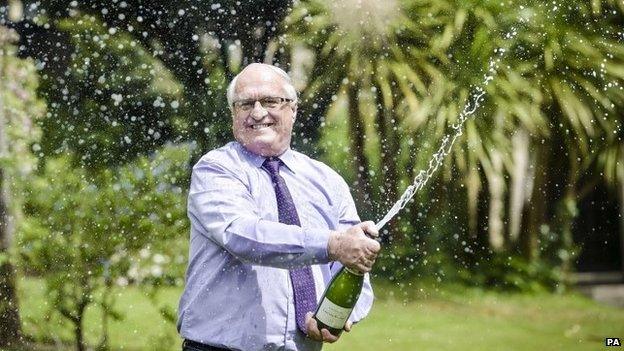Lotto changes - behind the numbers
- Published

There has been outrage on some front pages about the shake-up to the Lotto game announced this week.
The big difference, external is that the numbers from which you make your six selections will go up in October from one to 49 to one to 59.
While this doesn't sound like it will make a huge difference, it actually takes your odds of winning the jackpot from one in 14 million to one in 45 million.
Camelot, which runs the lottery, says that the new system will create bigger, rolling jackpots, which is true. Because it is so much less likely that anybody will win the top prize, there will be many more rollovers.
It also says that the chances of winning a prize have increased, which is true, because people who match two numbers will get a free go on the game the following week.
The chances of winning a cash prize, however, have fallen considerably.
The odds of winning £25 for matching three numbers fall from 57 to one to 97 to one
The odds of winning about £100 for four numbers fall from about 1,000 to about 2,200 to one
Five balls will still win you about £1,000 but the odds have dropped from 55,000 to one to 144,000 to one
And five balls plus the bonus ball goes from 2.3 million to one to 7.5 million to one with no change to the estimated £50,000 you would win.
There will also be a raffle that will give prizes of £1m and £20,000, for which the odds of winning depend on the number of entries, but the organisers estimate that you have a one in 10 million chance of winning either £1m on the raffle or the jackpot.
This change comes only two years after the last set of changes, which doubled the price of a ticket to £2 but introduced the raffle with £20,000 prizes.
At the time, the prize for matching three balls increased from £10 to £25. The odds of matching three balls were unchanged, but of course the cost of entry had doubled, which effectively doubled the odds (because £2 would previously have bought two tickets).
The estimated prize for matching five balls plus the bonus ball fell from £100,000 to £50,000 while the prize for matching five balls went from £1,500 to £1,000.
It appears that the Lotto organisers have discovered that what persuades people to buy lottery tickets is rollovers to create enormous prizes.
Camelot's commentary in its financial reporting about the effect that Euromillions rollovers (or the lack of them) have on ticket sales is very clear about that.
The company is clearly counting on the lengthening odds of winning both vast amounts of money and small and middling sums having less effect.
Because honestly, who can cope in their head with the difference between odds of 14 million to one and odds of 45 million to one?
It's like comparing the odds of flipping a coin and getting 22 consecutive heads with the odds of getting 24.
They both represent staggeringly unlikely events - it's just that in the case of a lottery it happens to someone every now and then.